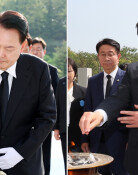Shipbuilding labor unions should face reality
Shipbuilding labor unions should face reality
Posted July. 27, 2018 07:32,
Updated July. 27, 2018 07:32
The management and labor of Hyundai Samho Heavy Industries and Hyundai Mipo Dockyard, affiliate companies of Hyundai Heavy Industries, have agreed on the introduction of a three-month flexible working hour system. From this month, the 52-hour work week has been implemented, but on condition of agreement, working hours can be adjusted with some flexibility if the requirement for the total amount of working hours is met over the entire span of three months.
In shipbuilding industry, test driving or emergency maintenance are considered as a position where the new 52-hour work system cannot be implemented. The working hours for test driving, for instance, is heavily concentrated shortly before the delivery of ship, and it is hard to implement a shift system as well since the driver should be onboard for scores of days. It is also a highly selective expert position with an additional requirement of four or more years of experiences, making it difficult to recruit additional drivers. This is why the Korea Offshore & Shipyard Association is demanding a measure taken at a government level. Indeed, Korean shipbuilders have called for the introduction of flexible hours to their labor unions.
However, the labor unions have rejected the request from their company over the concern of potential wage losses. Under the flexible hour scheme, companies are no longer obligated to give overtime allowances to their employees for the excessive amount work as it can be paid off with holidays. The labor unions of major shipbuilders including Hyundai Heavy Industries are still arguing that the 52-hours system should be complied with on a weekly basis, and more people should be recruited to make up for labor shortage. With the amount of workload falling and the prospect of downsizing in the offing, their demand to increase hiring does not sound so persuasive.
“Over the past 30 years, I have been involved in labor campaigns, believing it was justice. But now I realize that all I did was not just,” said Moon Sung-hyun, the head of the Economic, Social, and Labor Council who had served as the committee head of the Metal Workers’ Union under the Korean Federations of Trade Unions. “Had I known that labor campaigns had the effect of deepening and structuralizing the disparity among workers, I wouldn’t have served a labor activist.” Moon’s remarks should sound an alarm to large-sized companies and the militant trade unions with secure positions that are plagued with collectivism. “We had no choice but to prepare for the reality where the work hours invariably go over 52 hours a week,” said a union member of Hyundai Mipo Dockyard. This is a lesson that should be reserved for the labor unions of major shipbuilders who are going on strike and demanding a pay raise, conveniently turning a blind eye to their companies’ plummeting revenues.







